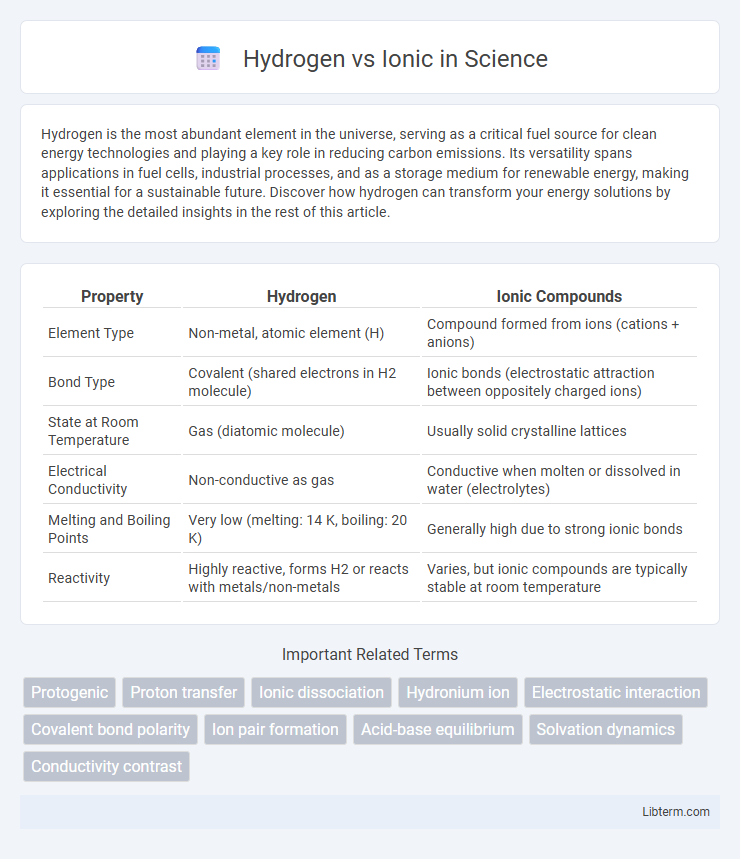Hydrogen is the most abundant element in the universe, serving as a critical fuel source for clean energy technologies and playing a key role in reducing carbon emissions. Its versatility spans applications in fuel cells, industrial processes, and as a storage medium for renewable energy, making it essential for a sustainable future. Discover how hydrogen can transform your energy solutions by exploring the detailed insights in the rest of this article.
Table of Comparison
| Property | Hydrogen | Ionic Compounds |
|---|---|---|
| Element Type | Non-metal, atomic element (H) | Compound formed from ions (cations + anions) |
| Bond Type | Covalent (shared electrons in H2 molecule) | Ionic bonds (electrostatic attraction between oppositely charged ions) |
| State at Room Temperature | Gas (diatomic molecule) | Usually solid crystalline lattices |
| Electrical Conductivity | Non-conductive as gas | Conductive when molten or dissolved in water (electrolytes) |
| Melting and Boiling Points | Very low (melting: 14 K, boiling: 20 K) | Generally high due to strong ionic bonds |
| Reactivity | Highly reactive, forms H2 or reacts with metals/non-metals | Varies, but ionic compounds are typically stable at room temperature |
Introduction to Hydrogen and Ionic
Hydrogen is a lightweight, non-metallic element known for its role in fuel cells and as a clean energy carrier, emphasizing sustainability and efficiency in modern technology. Ionic conduction involves the movement of charged ions through electrolytes, playing a crucial role in batteries, sensors, and electrochemical devices by enabling efficient energy transfer. Understanding hydrogen's atomic properties alongside ionic conduction mechanisms highlights their distinct yet complementary roles in advancing energy solutions.
Core Features Comparison
Hydrogen offers a robust framework optimized for building custom storefronts with seamless integration to Shopify, providing real-time data fetching and React-based components for enhanced developer experience. Ionic excels in cross-platform mobile app development using web technologies like HTML, CSS, and JavaScript, supporting native device features through Capacitor plugins. While Hydrogen targets e-commerce customization with server-side rendering and Shopify API access, Ionic emphasizes hybrid app performance and broad platform compatibility across iOS, Android, and web.
Performance and Speed
Hydrogen-powered engines offer faster acceleration and higher energy output per unit compared to ionic propulsion systems, making them ideal for applications requiring rapid response and high performance. Ionic propulsion provides superior efficiency and sustained operation in low-resistance environments but generally operates at lower thrust levels, resulting in slower speeds. The performance gap is most noticeable in terrestrial and atmospheric settings where hydrogen's combustion process delivers more immediate and powerful energy release.
UI Components and Customization
Hydrogen provides a highly modular approach to UI components, enabling developers to create custom storefronts with React-based components that offer flexibility and scalability. Ionic, on the other hand, focuses on cross-platform mobile and web app development with a rich library of pre-built UI components that are easily customizable through CSS and JavaScript. When prioritizing customization, Hydrogen emphasizes developer control over component architecture, while Ionic offers streamlined theming and adaptive UI elements suitable for rapid multi-platform deployment.
Platform Compatibility and Support
Hydrogen offers seamless platform compatibility through its native integration with Shopify, ensuring robust support for e-commerce functionalities and consistent performance across various devices. Ionic, based on web technologies like Angular, React, and Vue, delivers cross-platform support by enabling apps to run on iOS, Android, and the web with a single codebase. While Hydrogen excels in specialized e-commerce environments, Ionic provides broader platform versatility backed by a large community and extensive plugin ecosystem.
Developer Experience and Ease of Use
Hydrogen offers a tailored developer experience with React-based components optimized for building e-commerce storefronts rapidly, enhancing ease of use through pre-built hooks and seamless integration with Shopify APIs. Ionic provides cross-platform mobile app development with a broad component library and well-documented UI elements, promoting ease of use for developers familiar with web technologies like Angular, React, and Vue. Hydrogen's focus on commerce-specific tooling contrasts with Ionic's general-purpose mobile development approach, impacting development speed and customization options depending on project requirements.
Community and Ecosystem
Hydrogen offers a vibrant community supported by Shopify developers and eCommerce experts, fostering rapid innovation and extensive resources tailored specifically for headless commerce. Ionic's ecosystem spans beyond eCommerce, leveraging a large open-source community that supports diverse cross-platform mobile app development, enriched with extensive plugins and integrations. The specialized nature of Hydrogen's community drives targeted commerce solutions, while Ionic's broad ecosystem ensures versatility and adaptability across industries.
Security Considerations
Hydrogen wallets use encrypted private keys stored locally, reducing exposure to centralized server risks and enhancing user control but requiring vigilant device security to prevent unauthorized access. Ionic wallets often incorporate multi-factor authentication, biometric verification, and hardware wallet compatibility, providing robust defenses against phishing and cyber-attacks while maintaining convenience. Evaluating security in Hydrogen versus Ionic depends on the balance between decentralized key management and integrated protection features tailored to user behavior and threat landscape.
Use Cases and Industry Adoption
Hydrogen fuel cells excel in heavy-duty transportation, aerospace, and large-scale energy storage due to their high energy density and rapid refueling capabilities. Ionic technologies, such as ionic liquids and ionic batteries, dominate in electronics, chemical manufacturing, and electrochemical applications because of their stability, conductivity, and versatility. Industry adoption of hydrogen is rapidly increasing in automotive and energy sectors, while ionic solutions are primarily integrated into advanced materials and specialized industrial processes.
Conclusion: Choosing Between Hydrogen and Ionic
Choosing between Hydrogen and Ionic depends on project goals, development speed, and platform preferences. Hydrogen excels in building custom Shopify storefronts with React, providing flexibility and seamless Shopify integration, while Ionic offers a cross-platform solution for broader app development with extensive native device support. Prioritize Hydrogen for e-commerce-specific React experiences and Ionic for versatile hybrid app projects targeting multiple platforms.
Hydrogen Infographic

 libterm.com
libterm.com